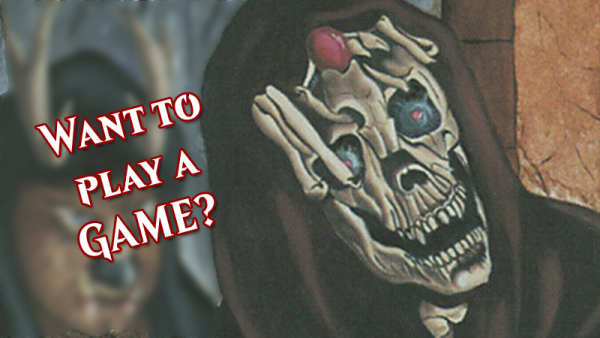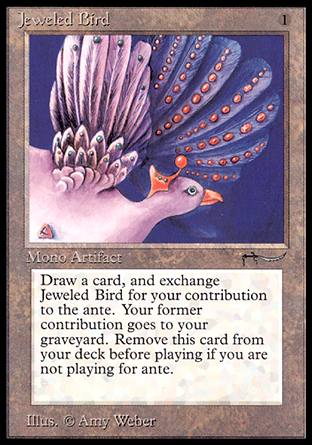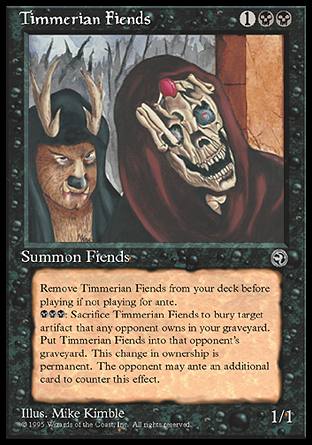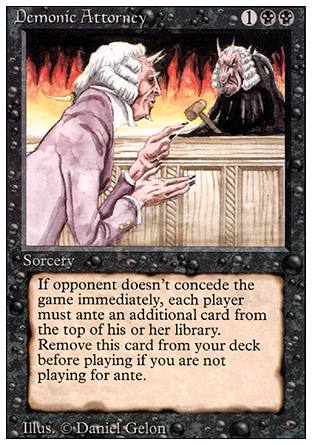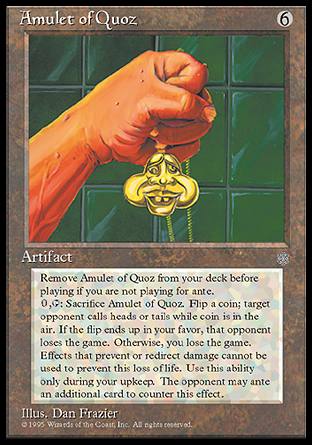It's time to look back at Magic: The Gathering's ante system.
From day one, players could risk their own Magic: The Gathering cards for a chance to win their opponent's. Yup, it's time to look back at the game's ante system.
Basically, the rules stated that if players decided to ante, then a random card could be chosen into the "ante zone" with the winner getting it once their opponent was defeated. A few cards specifically called out ante, such as Jeweled Bird and Timmerian Fiends, mostly because of how much taking them out could mess up a deck, but for all intents and purposes, starting with the game's original set from summer of 1993, this was fair game.
Magic creator Richard Garfield and others though the ante system would bring a gambling flair and thrill into the game by bringing to it in a sense of risk to playing. But, to their shock, players hated this. And you can probably guess why.
If they had a really good, expensive card in their deck and the other guy chose a basic land or otherwise relatively worthless card, players would be understandably upset and try to back out of the deal. More than a few fights broke out over this, and "We're not playing ante" went from being a house rule to being the norm.
Wizards of the Coast also had another reason not to like it. As antes could legally be seen as a form of gambling, higher ups began thinking about what the real consequences could be. Namely, if places began recognizing MTG as gambling, a whole host of special licenses and Las Vegas-style oversight was dwelt upon. Would they need a gaming commission? In the mid 1990s, this meant that Magic tournaments in the U.S. would have had to be limited to pretty much the state of Nevada, Atlantic City (Better check travel insurance for 'stabbed under a boardwalk'), tribal casinos, and the few other legal places it could be found at the time.
So, within a few years, all notes of ante were erased from cards, with Homeland's Timmerian Fiends being the last card to have ante in 1995. Eventually, all nine cards with ante were banned and all instances of ante were removed from play except for very specific instances where everyone agrees to do it and it's held in jurisdictions that allow gambling. All sanctioned events don't allow it anymore, nor do any game stores, really, with the last notable event to hold an ante match being the 2001 Invitational.
Still, ante never technically went away as unsanctioned and kitchen table matches can still allow it if players agree to it, but it's likely that we have seen the last of ante from any sort of meaningful (or even casual) tournament play.
However, for a brief time, Magic did more-or-less flirt with gambling. Not all tabletop games can claim that.
Oh, and for reference, those nine "ante matters" cards are:
- Amulet of Quoz (Ice Age)
- Bronze Tablet (Antiquities & 4th Edition)
- Contract from Below (Limited through Revised)
- Darkpact (Limited through Revised)
- Demonic Attorney (Limited through Revised)
- Jeweled Bird (Arabian Nights & Chronicles)
- Rebirth (Legends & 4th Edition)
- Tempest Efreet (Legends & 4th Edition)
- Timmerian Fiends (Homelands)


